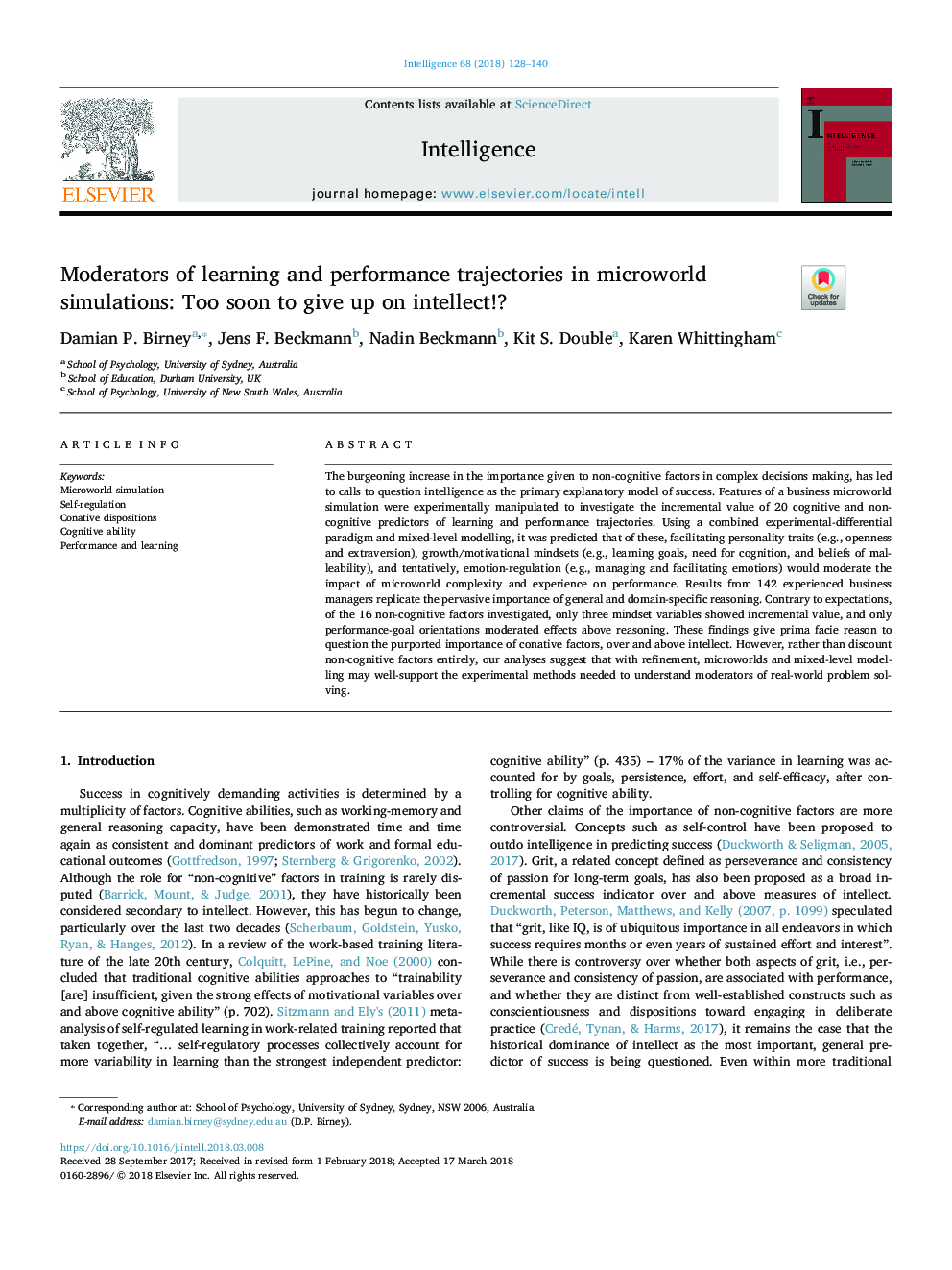| کد مقاله | کد نشریه | سال انتشار | مقاله انگلیسی | نسخه تمام متن |
|---|---|---|---|---|
| 7292896 | 1474248 | 2018 | 13 صفحه PDF | دانلود رایگان |
عنوان انگلیسی مقاله ISI
Moderators of learning and performance trajectories in microworld simulations: Too soon to give up on intellect!?
ترجمه فارسی عنوان
مدیران یادگیری و مسیرهای عملکرد در شبیه سازی میکروورلد: خیلی زود به عقب بردن به عقل !؟
دانلود مقاله + سفارش ترجمه
دانلود مقاله ISI انگلیسی
رایگان برای ایرانیان
ترجمه چکیده
افزایش فزاینده ای در اهمیت دادن به عوامل غیر شناختی در تصمیم گیری های پیچیده، منجر به فراخوانی پرسشی هوشمند به عنوان مدل توضیحی اولیه موفقیت شده است. ویژگی های یک شبیه سازی کسب و کار میکروورلد تحت آزمایش قرار گرفتند تا به بررسی ارزش افزوده 20 پیش بینی کننده شناختی و غیر شناختی مسیر یادگیری و عملکرد می پردازند. با استفاده از پارادایم تجربی-دیفرانسیل و مدل سازی مخلوط، پیش بینی می شود که این ویژگی ها، تسهیل صفات شخصیتی (مثلا باز بودن و برونسپاری)، اندیشه های رشد / انگیزشی (به عنوان مثال، اهداف یادگیری، نیاز به شناخت و باورهای انعطاف پذیری) و به صورت آزمایشی، تنظیم احساسات (به عنوان مثال، مدیریت و تسهیل احساسات) می تواند تاثیر پیچیدگی های مایکروویو و تجربه در عملکرد را تعدیل کند. نتایج از 142 مدیر کسب و کار با تجربه، اهمیت فراگیر کلیه و استدلال خاص دامنه را تکمیل می کند. برخلاف انتظارات، از 16 عامل غیر شناختی مورد بررسی، تنها سه متغیر ذهنیتی، ارزش افزوده را نشان دادند و تنها جهت گیری های عملکردی-هدف، اثرات تعدیل شده بالاتر از استدلال را نشان می داد. این یافته ها به دلایل اولیه برای پرسیدن اهمیت اظهارنظر فاکتورهای متضاد، بیش از حد عقل می پردازند. با این حال، به جای اینکه فاکتورهای غیر شناختی تخفیف به طور کامل، تجزیه و تحلیل های ما نشان می دهد که با تکمیل، مدل های میکرو و مدل های مخلوط می تواند از روش های تجربی مورد نیاز برای درک مدیران حل مسئله در دنیای واقعی حمایت کند.
موضوعات مرتبط
علوم انسانی و اجتماعی
روانشناسی
روانشناسی تجربی و شناختی
چکیده انگلیسی
The burgeoning increase in the importance given to non-cognitive factors in complex decisions making, has led to calls to question intelligence as the primary explanatory model of success. Features of a business microworld simulation were experimentally manipulated to investigate the incremental value of 20 cognitive and non-cognitive predictors of learning and performance trajectories. Using a combined experimental-differential paradigm and mixed-level modelling, it was predicted that of these, facilitating personality traits (e.g., openness and extraversion), growth/motivational mindsets (e.g., learning goals, need for cognition, and beliefs of malleability), and tentatively, emotion-regulation (e.g., managing and facilitating emotions) would moderate the impact of microworld complexity and experience on performance. Results from 142 experienced business managers replicate the pervasive importance of general and domain-specific reasoning. Contrary to expectations, of the 16 non-cognitive factors investigated, only three mindset variables showed incremental value, and only performance-goal orientations moderated effects above reasoning. These findings give prima facie reason to question the purported importance of conative factors, over and above intellect. However, rather than discount non-cognitive factors entirely, our analyses suggest that with refinement, microworlds and mixed-level modelling may well-support the experimental methods needed to understand moderators of real-world problem solving.
ناشر
Database: Elsevier - ScienceDirect (ساینس دایرکت)
Journal: Intelligence - Volume 68, MayâJune 2018, Pages 128-140
Journal: Intelligence - Volume 68, MayâJune 2018, Pages 128-140
نویسندگان
Damian P. Birney, Jens F. Beckmann, Nadin Beckmann, Kit S. Double, Karen Whittingham,
